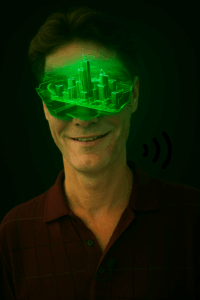
Let me tell you about Daniel Kish.
You probably haven’t heard of him, which is strange, because the guy is basically Batman. Not the billionaire vigilante with gadgets and a gravelly voice, but a real human who taught himself echolocation after losing his eyesight as a baby. I had to prompt a daily AI task to discover his story and I’m still surprised it isn’t viral, household-name, Netflix-doc-level material.
Here’s the short version: Daniel had both eyes removed before his second birthday due to retinal cancer. That’s a brutal start in life by any standard. But instead of being defined by darkness, he decided to map it. Like bats do. He trained himself to use tongue clicks and listen for echoes bouncing off nearby surfaces. It’s called echolocation, and while bats are born with it, Daniel taught himself — and now teaches others. He doesn’t technically “see,” but he senses space, shape, and motion. He can even ride a bike.
Yes. Ride. A. Bike.
Not guided. Not on a tandem. On his own. Navigating the world using sound in place of sight — something most of us couldn’t imagine doing in a quiet room, let alone on a moving bicycle.
And yet we scroll past hours of nonsense content online, while stories like Daniel’s barely register on our feeds. What gives?
Morning Sparks: Why These Stories Matter
That’s exactly why I run a little morning experiment. I use AI to fetch me a fresh, inspiring story every day. I’ve had a few now and while most didn’t quite stick, Daniel Kish did. Hard.
One earlier story was about Icelandic horses. These sturdy little animals have been isolated on the island for over a thousand years. No imports. Pure breed. But what’s special? Their hooves and bodies are so finely tuned to the environment that they instinctively avoid paths where volcanic eruptions or tremors may occur. They sense deep frequencies that we don’t. Some call them nature’s bio-sensors. I call that wisdom passed down through biology.
See where I’m going with this?
From Icelandic horses to Daniel Kish — both remind us of what’s possible when instinct meets adaptation. The horses, shaped by nature over centuries, respond to the land with almost supernatural awareness. Daniel, on the other hand, shaped himself through deliberate effort, developing an ability that most people can’t imagine. One is evolution’s wisdom, the other is human will — yet both show us that heightened perception is within reach when we trust our biology and train beyond our limitations. When biology meets belief. When we stop listening to what the world thinks is possible and start training our own senses to listen differently.
The Bannister Effect: Breaking Limits
It’s the same reason I use the story of Roger Bannister in AI workshops. Bannister broke the four-minute mile in 1954, even though everyone believed it was humanly impossible. Once he did it — once the barrier was broken — others followed in a matter of weeks. Not decades. Weeks.

OpenAI’s launch of ChatGPT 3.5 was the Bannister moment for artificial intelligence. It was the first time a conversational AI felt truly accessible and usable by the general public — fluid, responsive, and surprisingly capable. Suddenly, people weren’t just talking about AI; they were talking with it. And since then? We’ve seen a wave of innovation crash forward like a flood. Once the ceiling cracks, the sky isn’t the limit anymore — it’s the launchpad.
What Other Abilities Lie Dormant in Us?
What can we still teach ourselves — and more importantly, pass on to our children — if we tune out the constant distraction of consumerism, doomscrolling, and algorithmic noise?
Maybe we won’t all become echolocating Batman, but maybe, just maybe, we’ve all got a few superpowers waiting to be awakened — if we’re willing to listen beyond the noise. That’s why I keep running my little morning experiment with AI: to hunt for the hidden extraordinary. Because in a world numbed by noise…
Wonder is rebellion and imagination is our first superpower.
What's on your mind?